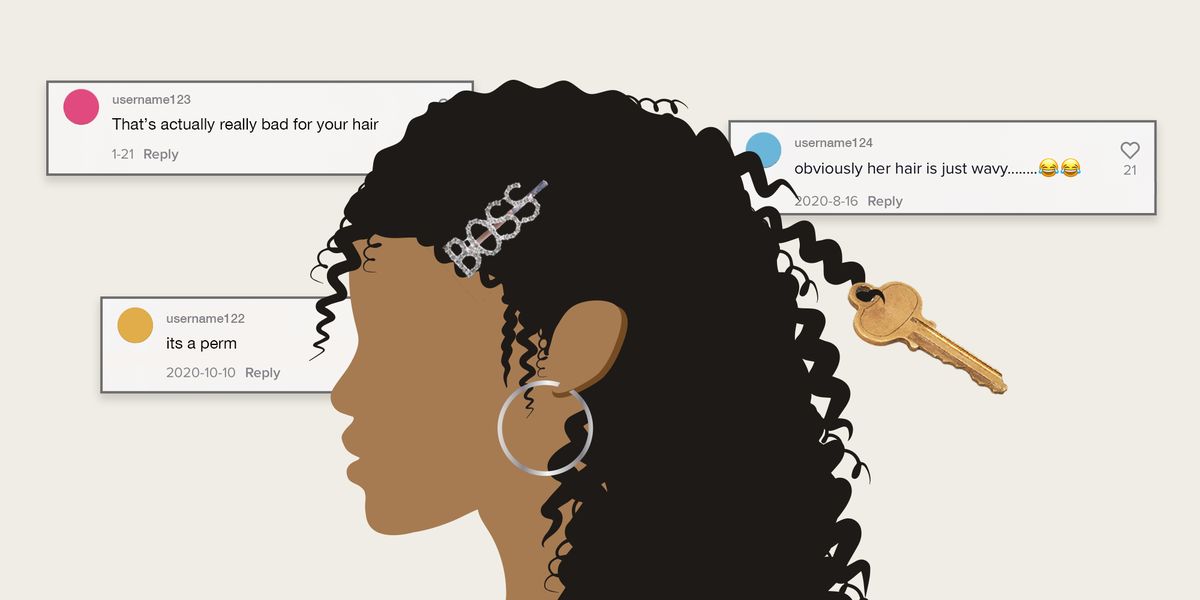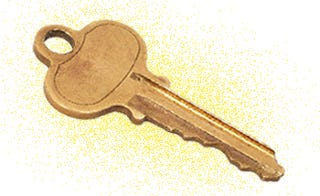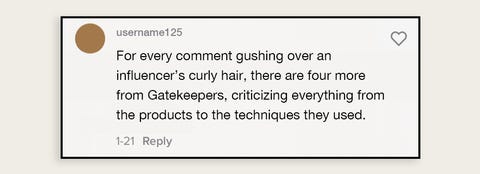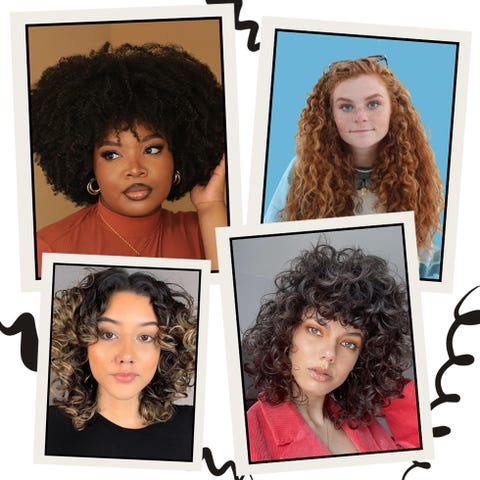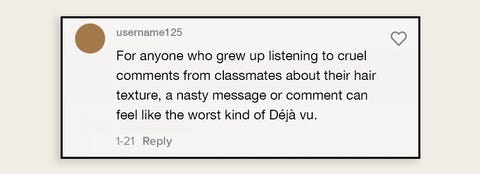Products You May Like
Almost everyone who grew up with curly hair will tell you: The journey to love your hair is hard. Learning to style it, care for it, rock it, and be unselfconscious about it can be even harder. For me, having spent my formative years clutching a flat iron in the era where the beauty standard was pin-straight hair, curly hair wasn’t just “unmanageable,” “unruly,” and “untamed.” It was “unprofessional,” “unkept,” and ultimately, just not beautiful.
While hair discrimination is still an ever-present reality, we’re thankfully moving into a space–online, at least–where there is more consumable content than ever that can teach people how to care for their various curls and textures. Social media sites and apps like YouTube, TikTok, and Instagram are giving platforms to curly girls, where they share tips, favorite products, and priceless advice to anyone who needs it. But just beneath the surface, the bullies are still there. Only now, they have curly hair, too.
If Curl Gatekeepers had a motto, I like to imagine it would be something like this: “Follow the rules. And we make the rules.” Lorraine Massey, creator of the #curlygirlmethod, ushered in a wave of exhaustive no-no lists for curly haired-folks when she launched her brand DevaCurl in 1994, before leaving the company in 2013. No sulfates, no silicones, and don’t even think about looking at heat were some of the foundational pillars of the #curlygirlmethod. While not all Gatekeepers follow Massey’s teachings, they definitely do seem intrigued with the idea of imposing a strict rule of law for the care and maintenance of curls.
Thanks to her loyal followers, the curly girl method has become a little more elusive, and the “real” curl experts live in the trenches of the comments sections of YouTube, TikTok, and Instagram. “Don’t dare categorize your curl pattern without submitting the proper paperwork. Don’t use products that we deem controversial. Don’t use that brush incorrectly. Don’t brush your hair at all. Don’t use shampoo. Why aren’t you using shampoo?” The consequences for a misstep, because it’s the Internet, is public bullying. Of course.
This “feedback” is hidden under the guise of protecting you from yourself. There’s a subtle threat running through nearly all rude comments: You’re going to destroy your curl pattern if you don’t listen to me. Don’t cry to me when your hair falls out. You’re setting a bad example. You don’t even know what you’re doing. You’re faking it. For every comment gushing over an influencer’s curly hair, there are four more from Gatekeepers, criticizing everything from the products to the techniques they used, denouncing their methods.
What’s missing from this equation is ultimately lived experience. For some people, sulfates may wreak havoc on their hair. For others, it’s what keeps their scalp free of build-up. A thick cream might be the key to clumped, DNA-spiral curls for one head of hair. For others, it may weigh their hair down and make curls sag. None of that nuance is readily digestible in a comment section, though.
And while the Curl Gatekeeping brigade may be a well-meaning bunch, these Gatekeepers were forged in a time when the Internet offered so little support for curly and natural haired people. For women like Zenita Collie, who publishes content about her natural hair for her 70k Instagram followers and 54k YouTube subscribers, the videos she used to watch to get insight from were ultimately not going to be useful. “Knowing what I know, even if [those influencers] have the same curl pattern, they didn’t have the same porosity as me.”
Whether they admit it or not, in 2021 a majority of Curl Gatekeepers are operating on old information. After all, one of the most popular TikTok sounds in the curly hair space is someone saying, “If your hair isn’t curly when wet, you don’t have curly hair,” which comes from a blatant misunderstanding of hair porosity. Collie has a theory: In the early days of the Internet, nearly all content surrounding curly and natural hair was put forth by the everyday person, not professionals. But since they took up the majority of the space, and grew in popularity, amateurs ended up having the most power. “Social media had the upper hand on what you could or couldn’t do with your hair, because they were ahead before the professionals were,” Collie said. But now, things are changing: “The natural hair professionals have started to enter the game.” With that comes a deeper understanding of what actually impacts hair health. But that hasn’t stopped the amateurs from guarding the gates.
Of course, not all the comments come from a place of education or correction. Some of the nastier comments are simply about the validity of someone self-identifying their texture. Betsy Muller, who boasts 27k followers on Instagram, and 164k followers on TikTok, straightened her hair for years, and has been inundated with curl-denier commenters. Common comments read, “Obviously her hair is just wavy.” Another: “You can’t have 2C curls because you’re not mixed.” Magdalena Cegielska, who regularly talks about her hair routine on Instagram, gets similar messages. “A lot of people are just saying that I have fake hair,” she says. “I’m putting so much effort into it. Don’t tell me that this is fake.”
The majority of these comments are directed at people with looser curl patterns, who may fall into the 3A or looser area of the notorious curl type chart–which ranges from 1, which is straight, to 4C, which is tight coils. Joelisa Saladin, who gives hair tutorials to her 39k Instagram followers and 144k TikTok followers says, “A lot of people get attacked in the hair community for having looser curls or even wavy hair. Anything below 3B, which are smaller curls. Everything else I feel like is not really accepted.” Curly hair, being fragile and often temperamental, is extremely susceptible to damage, which can loosen a curl pattern. So anyone at the beginning of their hair journey is likely to have wavier hair than someone who’s been caring for their texture for years. That looser pattern will only make it harder for beginners to find a community online. “It’s like a closed door,” says Saladin, “where if you don’t already have curly hair, you can’t get in.”
Despite calls to just ignore hate or focus on the positive, those comments aren’t easily brushed aside. “I didn’t want the negativity,” said Collie. “I can’t handle it because I’m a real person.” For Muller, it’s the cruel Direct Messages on her Instagram that are the hardest to deal with. “They had to go to your Instagram from your TikTok, and write you something mean.” Saladin was so inundated with hateful messages that she considered never mentioning her hair online again. “A lot of times it has killed my confidence. At one point I felt like I just didn’t even want to post my curly hair anymore.” Especially for anyone who grew up listening to cruel comments from classmates about their hair texture, a nasty message or comment can feel like the worst kind of Déjà vu. “A lot of people have emotional connections to their hair,” says Saladin. “So just imagine growing up being told that your hair was not good.” After one kid in Muller’s class made a rude comment about her hair, Muller says, “It took me six more months to wear my hair curly to school again. It scars you.” Reaching the cruelty levels of middle schoolers is truly a feat.
For these creators, the main issue lies in the lack of recourse for avoiding the wrath of these Guardians. So-called “controversial hair products” which have been blacklisted by the curly hair community for one reason or another, are an easy way to end up with an inbox full of hate. “I’m a college student,” Muller protested. “I don’t have a lot of money to spend on $30 shampoo and a $30 conditioner once a month.” But even for someone who’s curls look healthy and gorgeous–which should be enough evidence to debunk a product being “controversial”–that won’t ward off the Gatekeepers. It doesn’t matter if you livestream your hair drying for six hours (Yes, people have done that), there will still be a comment saying, “You obviously got a perm.”
If the goal is to allow more curly-haired people to accept their natural texture and wear it with confidence, Curl Gatekeepers clutching their sulfate-free shampoo and deep conditioning masks are not helping. “Now that curly hair is being more accepted, we should want other people to also accept their hair. We shouldn’t gatekeep,” says Saladin. “If we could just stop being so hateful towards each other and try to support one another, help each other in the journey, the curly hair community could have a better reputation. Because right now everyone sees it as toxic.”
In response to a Curl Gatekeeper in her comment section, Collie has a standard comeback: “My biggest rebuttal is always come and show me how to do it,” says Collie. “I always tell people, if you want to say something about how I did something, the way I did it, come do it for me. If you can’t do it for me, I don’t want to hear it.” When it comes to monitoring her comment section, Collie has a message for the Gatekeepers: “Just know if you’re going to try me, I don’t care. Or if you are, tell it to your mom, tell it to somebody else, just don’t bring it here. If you think you’re going to get the result or the reaction you think you’re going to get, bring it somewhere else. It’s not here.”
But besides the nasty comments are positive ones that make the grueling process worth it. Connecting with new people, finding new brands and techniques are just some of the benefits. Helping younger–or older–generations learn to care for their curls is another. For Muller, whose head of red curls generates a lot of underhand comments, seeing fellow redheads embrace their hair is one of the most rewarding experiences. “I’ve definitely gotten messages from girls being like, ‘I have red curly hair and I never wanted to wear it naturally because people told me I looked like Merida or I looked like Raggedy Ann. Now, I feel like I can wear it naturally, because people are going to think I look like you.'” She pauses. “That made me melt.”
“I have a lot of people telling me, ‘You’ve really changed things for me. I didn’t even know my hair could be this curly. All your tips really helped me,'” says Saladin. “And just being able to help people makes me realize it’s worth it. That’s what makes it worth it. Talking about it, being able to help people get to the point where they love their hair.”
This content is created and maintained by a third party, and imported onto this page to help users provide their email addresses. You may be able to find more information about this and similar content at piano.io
